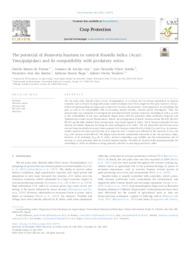The potential of Beauveria bassiana to control Raoiella indica (Acari: Tenuipalpidae) and its compatibility with predatory mites.
The potential of Beauveria bassiana to control Raoiella indica (Acari: Tenuipalpidae) and its compatibility with predatory mites.
Author(s): FREITAS, G. S. de; LIRA, V. A.; JUMBO, L. O. V.; SANTOS, F. J. dos; REGO, A. S.; TEODORO, A. V.
Summary: The red palm mite, Raoiella indica (Acari: Tenuipalpidae), is a serious pest of coconut plantations in tropical countries such as Brazil. Ecologically-sound control strategies have been sought for this pest; however, the potential of entomopathogenic fungi such as Beauveria bassiana (Hypocreales: Cordycipitaceae) in controlling this pest, as well as its compatibility with co-occurring natural enemies, remains poorly investigated. Thus, the present study was conducted to investigate the potential of four B. bassiana strains in controlling R. indica, as well as the compatibility of the most pathogenic fungal strain with the predatory mites Amblyseius largoensis and Typhlodromus ornatus (Acari: Phytoseiidae). Briefly, the pathogenicity of four B. bassiana strains (Bb-032, Bb-053, Bb-057 and Bb-086), isolated from coconut pests, were tested against R. indica. The B. bassiana strain Bb-032 was selected for further bioassays for being the most pathogenic to R. indica. The red palm mite survival and mean survival time drastically decreased when exposed to B. bassiana strain Bb-032 at both LC50 and LC80. In contrast, neither survival nor mean survival time of A. largoensis and T. ornatus were affected by the exposure to LC50 and LC80 of B. bassiana strain Bb-032. The fungal strain showed considerable selectivity to the two predatory mites; however, at its estimated LC80 for R. indica, reduced oviposition, egg viability and the instantaneous rate of increase (ri) were generally observed for both natural enemies. Therefore, B. bassiana holds potential promise for controlling R. indica in addition to being generally selective to non-target predatory mites.
Publication year: 2021
Types of publication: Journal article
Observation
Some of Embrapa's publications are published as ePub files. To read them, use or download one of the following free software options to your computer or mobile device. Android: Google Play Books; IOS: iBooks; Windows and Linux: Calibre.
Access other publications
Access the Agricultural Research Database (BDPA) to consult Embrapa's full library collection and records.
Visit Embrapa Bookstore to purchase books and other publications sold by Embrapa.

